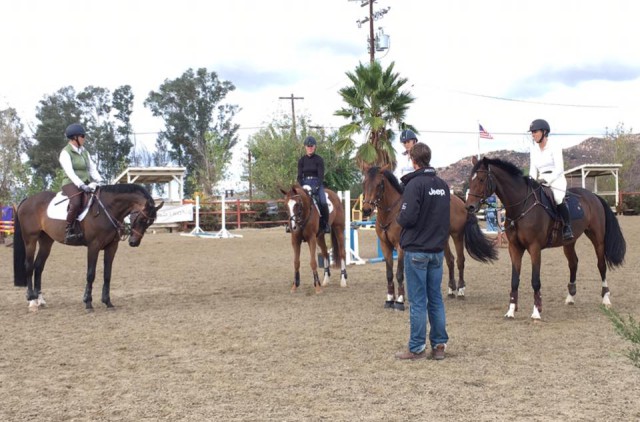Riding in or auditing a clinic with an upper level rider can yield a myriad of good results. It’s a prime opportunity to learn as much as you can if you are a student of your sport, and you’ll always come away with a few new tools to utilize in the future. If you have a clinic coming up, here are a few pieces of advice on how to maximize your learning experience and get the best experience possible.
1. Come with an open mind.
Not every clinician will bring training practices that you are familiar with or agree with. This is perfectly ok — as we all know, there are many schools of thought when it comes to training horses. One coach might tell you to ride with short reins to encourage steady contact, the next may advise you to loosen your reins to make the horse think on its own more.
While you likely have several ideas of best practices for you and your horse, it is still beneficial to come with an open mind to a clinic. I can’t tell you how many times I’ve seen a clinician have a rider try something unfamiliar to have it yield excellent results. Those “lightbulb” moments during a clinic are what we all strive for, and being open to new theory makes those possible.
2. Be ready to help out.
If you’re on the ground during the clinic or have time in between your rides, head into the ring to help out with jump crew or manure removal. Being close to the clinician and able to hear everything he or she is saying is wildly beneficial. You can get a look at what type of exercises you might be practicing in your group, or if you’re just helping out you can file the exercises away to try on your own.
Not only will you have the best seat in the house to watch the happenings, but you’ll also earn massive brownie points from the clinic host and organizer for being a helping hand. A clinician should never be picking up jumps that are knocked down, there should always be someone in the ring to help pick up poles or raise and lower fences. This reflects well on the organizer, and you’ll burn some calories to boot!
3. Look your best to feel your best.
Everyone gets a few nerves when they’re preparing to ride in front of a big name. Make sure that your tack is spotless, that your horse is appropriately clipped with a pulled mane and that your hair is neatly tucked into your helmet. Treat a clinic like a show in terms of turnout, as this not only makes a favorable impression but helps boost your confidence as well. Err on the side of conservative when choosing your saddle pad and attire, and go for the professional look rather than the “I just pulled my horse out of his pasture and threw him on the trailer” look. Trust me, this will make a world of difference when it comes to your confidence level heading into the ring.
4. Don’t be afraid to ask questions.
In a recent clinic with Buck Davidson, I found myself asking several questions as to the reasoning behind the instructions he was giving. Hearing him explain his theory was very interesting, and I found that I was able to really understand the “why” behind his teaching rather than just taking it at face value.
Of course, be aware of the situation and don’t interrupt the clinician or the riders to ask your question, but you should feel comfortable asking questions to clarify something you don’t fully understand. Be a sponge and absorb as much information as you can.
5. Be coachable.
Listen to what the clinician is telling you to do while you ride. Don’t make him repeat himself 12 times before you register that he is talking to you. Do your best to remember your jump course so that you don’t repeatedly go off course. Even if you’re unfamiliar with a concept, ask a question or try a different approach.
The entire point of a clinic is to learn. I’ve seen people arguing with a clinician or giving attitude, and my jaw about hit the floor with shock at the level of disrespect. While you may not ever use a particular exercise again, at least have the courtesy to give it a fair shot. And you never know, that exercise you’re not sure about may end up being a very useful tool for your horse.
A clinic is not meant to put massive pressure on you or your horse. A good clinician should push you out of your comfort zone without overfacing you or your horse, and they should have a good way of explaining what they want you to do. Hold up your end of the bargain, and you’ll find that the learning opportunities are endless, even if you are not riding.
Do you have any best practices to add to the list? Discuss them in the comments!




















